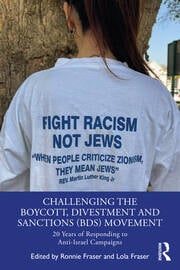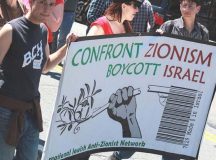This collection of essays prepared by Ronnie and Lola Fraser, veteran British anti-BDS activists, assesses how friends of Israel have responded over two decades to efforts by the international boycott, divestment, and sanctions movement aimed at delegitimising and isolating the Jewish state. Included are discussions of responses in Great Britain, in South Africa, and in the United States, the development of the European working definition of antisemitism, online BDS, and several other relevant topics. Rather than an explicitly comparative project, the essays are presented independently, each in a topical or summative manner. The editors make no claim to offering a comprehensive history of global responses to BDS nor to analytically appraising BDS’ impact or effectiveness one place to another. BDS is also identified clearly as antisemitic, insist the editors, as a movement seeking to deny the right of Jews to live as Jews in their own state with the same rights as all other peoples.
The collection is authoritative and useful, thanks in part to an opening essay by Israeli historian Dina Porat clarifying BDS movement origins in the wake of the Durban Conference in South Africa in 2001 and in further actions taken in 2005. An international campaign based on the South African anti-apartheid campaign would seek to isolate Israel and make of it a pariah state among nations. A coordinating body, the BDS national committee, ostensibly rooted in Palestinian civil society, would coordinate multiple voluntary efforts undertaken in host nations demanding targeted publics support boycotts of Israeli goods and academics, divestment from institutions dealing with Israel or sanctions against corporations supplying Israel. A later essay by Gerald Steinberg makes it clear that the International Non-Governmental (NGO) Network plays a central role in promotion the BDS movement.
The key arenas of conflict in Great Britain and the U.S. were on university campuses and in organised labour. Early on, the trades unions in Britain offered the greatest support for BDS, and British university campuses and student groups offered additional opportunities to win endorsement, garner public attention, and attack and defame Israel. BDS mobilisations on campuses also became breeding grounds for what is identified as ‘the new antisemitism,’ as BDS efforts often drew openly on clear antisemitic themes and images from the long history of antisemitism to attack Israel. BDS operations were prominent in the student movement in Britain and on several British campuses, especially in or near London. Open confrontations of pro- and anti-BDS elements in the U.S. and on U.S. campuses trailed behind Britain in numbers initially but expanded subsequently, after the ten-year mark, occurring first in the West, on California campuses, then in the Midwest and East. Student voted resolutions and union resolutions challenged the legitimacy of the Jewish state and Zionism, attacked Israeli actions and policies, and identified Israel as racist, colonial, and apartheid-like. In turn, in British unions and the Labour Party, and in U.S. universities, an antisemitic discourse rose alongside movement efforts. In places where BDS was active, existence became increasingly fraught for many Jewish affiliated unionists, party members, and students.
After nearly a decade of standing up for Israel against such BDS resolutions in the University and College Union (UCU), the union of university and college faculty in Britain, Ronnie Fraser, the editor of this volume, could no longer recognise the union as an institution hospitable to Jews, bringing suit against the UCU for alleged ‘institutional antisemitism’ and unlawful harassment. Despite a strong presentation the case produced a terrible outcome: the tribunal that heard it decided in favor of the UCU, ruling that union leaders and member statements were permissible expressions of free speech, neither defamation nor harassment. Thirty-four individuals testified and submitted written statements – Christians, Jews, Muslims, atheists, academics, Jewish communal leaders – describing the tormenting atmosphere and stating that union gatherings were places where true believers spoke to one another about Israeli imperialism and aggression and harassed and threatened those with different views. To David-Hillel Ruben of Birkbeck College, the University of London, a long-time unionist and one of the witnesses in the case, the anti-Israel sentiment had crossed the line into pure antisemitism.[1]
Readers should understand some of the context. These were years of sweeping post-colonial agitation in higher education and only to a lesser degree in labour institutions. Agitation was pressed against a backdrop of continuing globalisation and growing inequality, of recession, and of continuous Israeli-Palestinian wars 2006, 2012, and 2014 mostly with Gaza, with missiles flying and radically unequal casualties occurring. The essays in this collection sidestep exploring or developing this context adequately and deal directly with BDS efforts and anti-BDS responses primarily. Ronnie Fraser follows up the account of early agitation in Britain with discussion of the adoption and subsequent recognition of the International Holocaust Remembrance Alliance (IHRA) Working Definition of Antisemitism. Fraser says that IHRA politics played a key role in the fightback against BDS. The Working Definition, Fraser argues, had significant influence on British government policy as Britain was the first European government to publicly adopt the definition and subsequently called on all universities to do so as well.
Benji Shulman, an activist in the South African Jewish community, writing on the South African variant of BDS and on anti-BDS opposition highlights the Third World currents that played strongly in South African universities, offering fertile ground for agitation. Like their counterparts in Britain, South African friends of Israel learned over time through experience to critically engage BDS forces, and combat their arguments, to create alliances, to shape counter-struggles on campus consistent with university values of free speech, dialogue and free inquiry, and to mobilise anti-BDS sentiments in the South African Jewish community.
Miriam F. Elman, Director of the Academic Engagement Network (AEN), an organisation of faculty formed in 2015 to counter BDS campaigns as they grew in the U.S., explores the anti-Israel movement on U.S. campuses. Rejecting peace, opposing reasoned debate, and dialogue, BDS cast Israel as an unjust colonial settler-state, an apartheid society, and an evil opponent of all that is fair and legitimate. Over time, BDS also went so far as to seek to exclude Jewish and Zionist students from equal participation in campus life at select universities, defaming and stereotyping Jewish students as enemies of progressive commitments because they support Israel. BDS campaigns stir toxic climates on many American campuses and curtail the academic freedom of faculty and students who desire to study or engage in research about Israel and the Middle East. Often, Jewish students on such campuses face pressures to hide their identities, lest identification as a Jew lead to harassment and ostracism. BDS attempts to close down study-abroad programs in Israel, to block appearances by Israeli scholars on U.S. campuses, and to demand divestment from organisations that do business with Israel.
Donna Robinson Divine, Morningside Professor Emerita at Smith, directs her attention in the best essay in the collection to the magical thinking and the fantasy arguments by BDS and to its efforts to distort and even undo history. To Divine, an ornate and well-funded international apparatus offers a BDS catechism in the form of public shaming of Israel and pitches a narrative and script for teaching about the Jewish state that emphasises war crimes, racism, and ongoing oppression. ‘What appears principled human rights politics is repeatedly justified setting the stage for … ongoing bloodshed, and also [and] opportunities to condemn Israel [when it takes actions to protect its citizens.]’[2] Divine describes a hegemonic discourse generated by BDS that straitjackets understanding and also works to exclude scholars who find it misleading, offensive, or confining.
Finally, several additional essays in the collection, by American Cary Nelson, Jubilee Professor Emeritus and Liberal Arts at the University of Illinois, Israeli David Newman, on weaponisation of BDS, and about BDS on-line and antisemitic hate, respectively, thoughtfully and aggressively take up ancillary topics. The drift is toward comprehending the weakening of BDS in Europe during the twenty-year era and the shift of the global weight of BDS toward America. An essay by Eran Shayson called ‘Why BDS is Destined to Fail,’ from the Reut group closes the collection, predicting the continued thinning of BDS with the continued centering of BDS struggle on American campuses.
What are the takeaways from this collection? The absence of a summary assessment makes it difficult to know for sure, but there are several themes that appear to stand out. One is the willingness of anti-BDS forces to confront BDS and its thought and claims, fully and aggressively; another is the importance of state adoption of the IHRA working definition of antisemitism and use of the standard to combat the craven discourse BDS stirs where it invades. A third is the importance of building alliances, often emphasising the key values of the institutions where conflict has been promoted. And fourth is the importance of cultivating and winning strong anti- BDS support in the relevant national Jewish community, whether in Britain, South Africa, or the United States.
The Frasers have made a positive contribution in looking at BDS and its impact globally in its first twenty years and offering insights about how to combat BDS in the university and labour institutions where it defames the Jewish State and promotes a discourse of hate that is particularly directed at Jews.
[1] Quoted in Bernard Harrison, Blaming the Jews: Politics and Delusion (Bloomington: Indiana U. Press, 2020), pp. 434-436. See Also David Hirsh, Contemporary Left Antisemitism (New York: Routledge, 2017)
[2] Donna Robinson Divine, in Fraser eds., Challenging the International Boycott, Divestment, and Sanctions (BDS) Movement, p. 128.



































